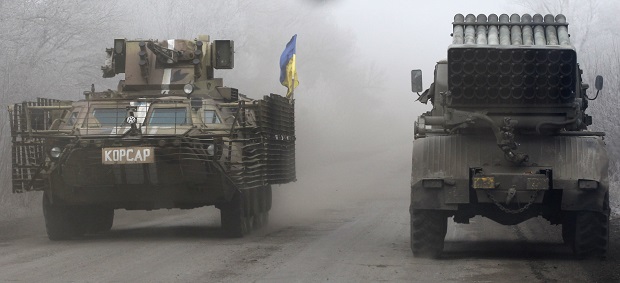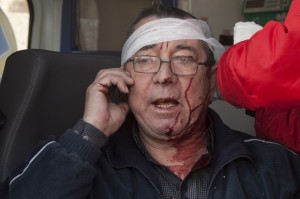Both sides claim violations after Ukraine ceasefire starts

Ukrainian military vehicles travel on the road between the towns of Dabeltseve and Artemivsk, Ukraine, Saturday, Feb. 14, 2015. The fighting between Russia-backed separatists and Ukrainian government forces has continued despite the agreement reached by leaders of Russia, Ukraine, Germany and France in the Belarusian capital of Minsk on Thursday. Much of the fighting had taken place near Debaltseve, a key transport hub that has been hotly contested in recent days. The leaders agreed to implement a cease-fire, set to take effect on Sunday, at one minute after midnight. AP
KIEV, Ukraine — A ceasefire was declared in eastern Ukraine at a minute after midnight Sunday, kindling slender hopes of a reprieve from a conflict that has claimed more than 5,300 lives.
But within two hours of the ceasefire’s scheduled start, the warring sides were already trading accusations of fresh attacks.
International attention will be focused in the coming days on the strategic railway hub of Debaltseve, where Ukrainian government forces have for weeks been fending off severe onslaughts from pro-Russian separatists.
The U.S. State Department said images from eastern Ukraine offer “credible pieces of evidence” that the Russian military has deployed larger amounts of artillery and multiple rocket launchers around Debaltseve to shell Ukrainian forces.
“We are confident that these are Russian military, not separatist systems,” State Department spokeswoman Jen Psaki said in a statement Saturday.
Ukrainian President Petro Poroshenko issued a cease-fire order in a live broadcast for all the country’s armed forces to hold their fire from one minute after midnight Kiev time (2201 GMT, 5:01 p.m. EST).
Accusations of violations were quick to follow.

A paramedic bandages the head of a wounded man after shelling between pro-Russian rebels and the Ukrainian government forces in Donetsk, Ukraine, Saturday, Feb. 14, 2015. Ukrainian forces and Russia-backed separatists traded accusations of violating the ceasefire within two hours after the cessation of hostilities took effect one-minute after midnight local time. AP
Ukrainian security services chief Valentyn Nalyvaichenko said one infringement was reported about 50 minutes after the deadline. Artillery salvoes were fired from an area that Nalyvaichenko said is under the control of a Cossack unit manned by Russian citizens.
Meanwhile, rebels accused the Ukrainians of deploying artillery shortly after midnight.
Donetsk News Agency, a separatist mouthpiece, cited senior rebel defense official Eduard Basurin as saying the Ukrainian forces garrisoned in Debaltseve fired artillery and mortars at rebel positions.
“In the interests of preventing the death of the civilian population, precise fire is being deployed toward the enemy’s positions,” Basurin was cited as saying.
The hours before the ceasefire were marked by ferocious battles around Debaltseve, as Ukrainian armed forces undertook desperate attempts to gain control over a highway linking the town to their rearguard.
Speaking to his Russian counterpart Sergey Lavrov by telephone Saturday, U.S. Secretary of State John Kerry expressed concern about what he called efforts by Russia and the separatists to cut off Debaltseve in advance of the cease-fire.
Separatist fighters insist they have fully encircled Debaltseve, which they say allows them to claim the territory as theirs. But Poroshenko said in his televised address that the road to the town remains open and that Ukrainian troops there had been resupplied with ammunition.
An undated satellite image issued by the Ukrainian government showed a five-kilometer- (three-mile-) long cloud of black smoke hovering above Debaltseve, evidence of what it said was the scale of rebel shelling in the hours before the scheduled start of the cease-fire.
Entire swathes of the war-stricken regions of Donetsk and Luhansk were caught up in artillery duels over the weekend.
Officials in the key government-held port city of Mariupol reported an array of rocket attacks hitting areas near the city Saturday morning.
Mariupol is on the Azov Sea and concerns are strong that the Russian-backed separatists aim to seize it to create a land corridor that runs between mainland Russia and the Crimean Peninsula, which Russia annexed 11 months ago.
Towns distant from the front line were not spared.
Projectiles rained down Saturday afternoon on the government-held town of Artemivsk, 40 kilometers (25 miles) north of Debaltseve, striking a school, which rapidly burned to the ground.
Russia has repeatedly denied Western claims that it has sent troops and equipment to aid the rebels. But on Saturday, the U.S. ambassador to Ukraine, Geoffrey Pyatt, posted on Twitter what he said were satellite photos showing Russian artillery systems near the town of Lomuvatka, 20 kilometers (12 miles) northeast of Debaltseve.
The images could not immediately be verified.
In a telephone call with Poroshenko hours before the start of the cease-fire period, President Barack Obama expressed his “deep concern about the ongoing violence, particularly in and around Debaltseve.”
The White House said in a statement that the two leaders “emphasized the pressing need” for all parties to implement the cease-fire and agreed to remain in contact in the coming days. Obama also spoke with German Chancellor Angela Merkel who took a lead role in negotiating the cease-fire agreement.
The deal was hammered out in a marathon talks this week between Merkel and her counterparts from Ukraine, Russia and France in the Belarusian capital, Minsk.
German Foreign Minister Frank-Walter Steinmeier said failure to maintain the peace would cost the region and the people of eastern Ukraine “a high price.”
“If we miss this opportunity, the chance to defuse the serious conflict in eastern Ukraine by way of negotiations will be gone for a long time,” Steinmeier said.
Speaking in Kiev on Saturday afternoon, Poroshenko said his government would take urgent measures if the Minsk agreement collapsed.
“If there is no peace, we may have to take the decision to impose martial law,” he said. “In this event, martial law will be imposed not only in the Donetsk and Luhansk (regions), but across the whole country.”
Cessation of hostilities is only the first in a series of planned steps agreed to in Minsk.
Withdrawals of heavy weaponry from the front line, creating a zone roughly 50-140 kilometers (30-85 miles) wide, depending on the caliber of the weapons, are to begin Monday and be completed in two weeks. No provisions are envisioned for the withdrawal of troops.
The peace plan also requires the Ukrainian government to resume paying pensions and state benefits to citizens in rebel-held territory. Ukraine’s financial blockade against the rebels has led to a catastrophic collapse in living standards in eastern Ukraine, depriving the poorest of any immediate means of support.
The fighting started in April after armed pro-Russian separatists took control of towns and official buildings in the Donetsk and Luhansk regions. The seizures began after Russia-friendly president Viktor Yanukovych was driven from power in the wake of months of protests in the capital, Kiev.
The separatists claim the new Ukrainian authorities are fascist-inspired and aim to suppress the heavily ethnic Russian population in the east.
RELATED STORIES
Ukraine ceasefire period begins; world holds breath
Ukraine bloodshed intensifies ahead of peace summit














